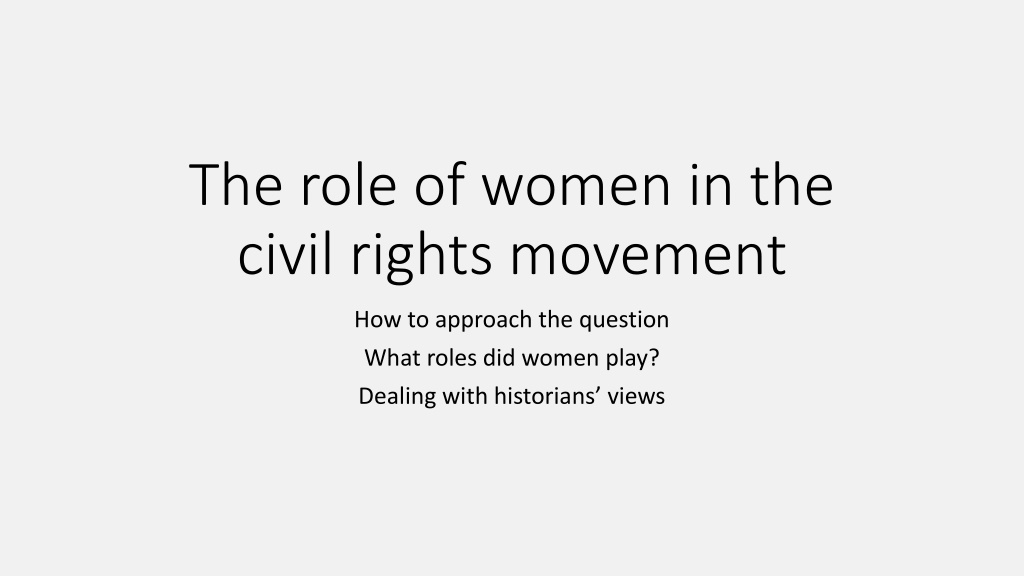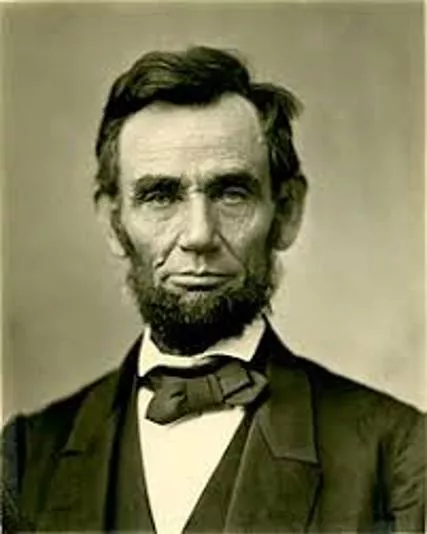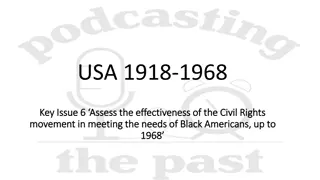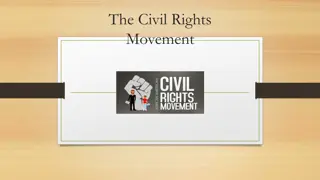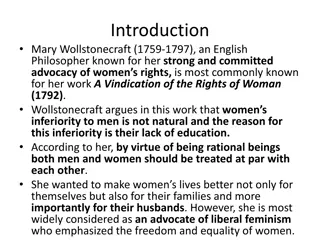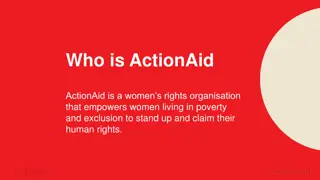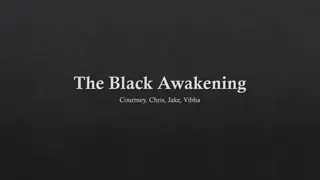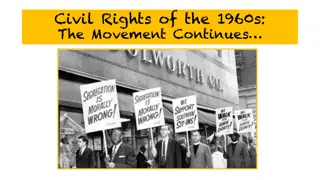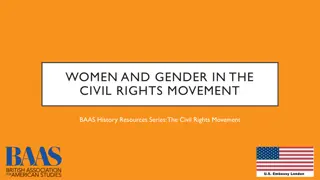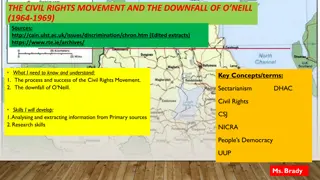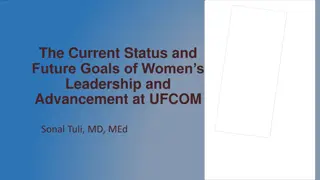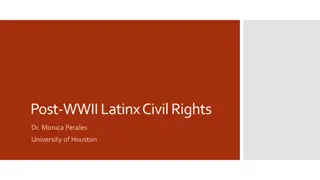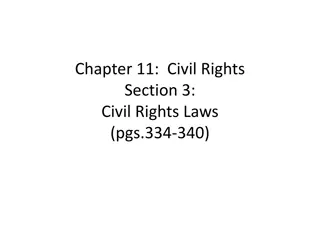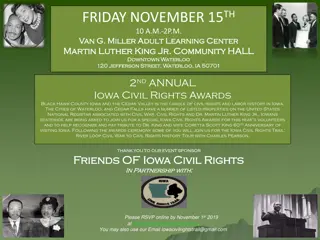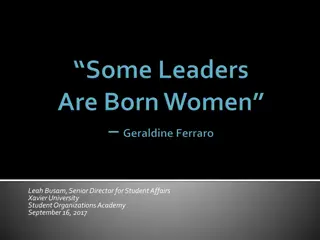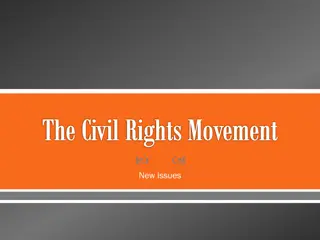Women's Leadership in the Civil Rights Movement: Unveiling Their Essential Roles
Delve into the vital but often overlooked roles that African-American women played in the Civil Rights Movement, going beyond followers to become leaders who initiated protests, formulated strategies, and mobilized resources. Understand why their contributions were indispensable for successful collective action.
Download Presentation

Please find below an Image/Link to download the presentation.
The content on the website is provided AS IS for your information and personal use only. It may not be sold, licensed, or shared on other websites without obtaining consent from the author. Download presentation by click this link. If you encounter any issues during the download, it is possible that the publisher has removed the file from their server.
E N D
Presentation Transcript
The role of women in the civil rights movement How to approach the question What roles did women play? Dealing with historians views
The role of women: how to approach the question In the context of 1880-XXXX, to what extent were African-American women key in the progression of Black civil rights? Harriet Tubman was heavily involved in helping slaves to escape. She helped over 300 slaves to get to freedom via the underground railway. She was more important than Lincoln, because although both of them freed slaves, Tubman really believed in the principle of freedom whereas Lincoln only freed slaves because he had to due to the war. What do you think of this extract from an essay? Are you convinced? Why or why not?
The role of women: how to approach the question In the context of , to what extent were African-American women key in the progression of Black civil rights? You can t argue that they were not important (otherwise why are you asking the question?) You can argue that they weren t the most important factor You will find it difficult to argue that any female activist is more important than Martin Luther King. You can argue that women (collectively) made a specific and unique contribution that was more important than Martin Luther King or other famous civil rights leaders You can argue that women made a specific and unique contribution that complemented and was equal in importance to the contribution of famous male leaders
Where to start? What is the specific and perhaps unique contribution of African- American women to the civil rights movement? Did they perform different roles to male activists? What roles did they perform? How important were these roles? What was their impact? Would famous male leaders have been successful without the input of women?
What roles did women play? Even while suffering the daily indignities heaped on them by their location in the structure of society, many southern Black women were much more than followers in the modern civil rights movement; many were also leaders who performed a variety of roles comparable to those of Black male leaders. Although seldom recognized as leaders, these women were often the ones who initiated protest, formulated strategies and tactics, and mobilized other resources (especially money, personnel, and communication networks) necessary for successful collective action. Invisible Southern Black women leaders in the Civil Rights Movement Bernice McNair Barnett In your own words, explain the roles played by women as outlined here. Why are they necessary for successful collective action?
What roles did women play? Organisers Educators Bridge leaders
What is a bridge leader? Someone who provides a link between formal civil rights organisations and ordinary people Persuades ordinary people to become involved in civil rights actions. Why is this important? Enables people to cross formidable boundaries between their personal lives and the political life of civil rights movement organisations What does this mean do you think? Often focus on strategies that aim to change the individual, their ideas and their consciousness. (What kind of individuals are we talking about?)
Bridge leaders/women Bridge leaders were not always women However, women were excluded from other more formal forms of leadership (e.g. the Black Church) so were more likely to become bridge leaders Some bridge leaders did not actually want the kind of leadership role that Martin Luther King and other famous men had. Advocated a more democratic, grassroots-led approach
Ella Baker You didn't see me on television you didn't see news stories about me. The kind of role that I tried to play was to pick up the pieces or put together pieces out of which I hoped organization would come.... I had no ambition to be in the leadership. I was only interested in seeing that a leadership had the chance to develop. Activist with SCLC (King s organisation), NAACP, CORE and helped found SNCC. Quoted in Invisible Southern Black women leaders in the Civil Rights Movement Bernice McNair Barnett
Things to consider The activities of bridge leaders and their impact (significance) Why bridge leaders were necessary what gaps did they fill in the civil rights movement?
Activities of bridge leaders and their impact Granted, as Morris notes, Dr King sought to transform the religion of the Black masses to that of a newfound activism and his speeches inspired individuals to participate in the movement but, as I have argued, it was the bridge leaders who provided the local community members with the day-to-day lessons in self empowerment How Long, How Long? Belinda Robnett, pg 23 What does she mean? Why is this role important? Why is it not enough just to hear some inspiring speeches?
Differences between bridge leaders and formal leaders Formal leaders (e.g. King) focussed on gaining white support or support from people in power (the state) Why would they do this? Why is it important? Does this limit their actions in some way? How is this different to the role of bridge leaders? Bridge leaders worked day-to-day with the people, unconcerned with the desires of the state A conduit between needs of ordinary people and the leaders could be a voice for the people in the civil rights movement.
You need some good examples! Robnett, page 55. Some good info on the Montgomery Women s Political Council and the links between female leaders Consider Rosa Parks and her time at the Highlander Folk School with Septima Clark good example of how change within can lead to activism Can you think of any other examples?
Some difficulties when writing about bridge leaders Ella Baker and Septima Clark are good examples of professional bridge leaders . They worked in key organisations, even if they didn t hold high positions. What other sort of bridge leaders are there and why is it more difficult to find out about them? Does this mean you should ignore them?
Historical interpretations You won t find any serious historian arguing that women were NOT important. You may find that many historians neglect to mention women activists! So, what point of view will you find as a comparison? Could look at any interpretation that takes a great man view of history. E.g. Any traditional interpretations arguing that famous civil rights leaders such as King are the most important factor.
100 years of female activists Where to start? Earliest possible is 1881 Atlanta Washerwomen s strike Where to finish? 1970s: Angela Davis, political leaders such as Shirley Chisholm Lots of women involved in high-profile NAACP: e.g. Ruth Batson and Jean McGuire in the Boston bussing crisis 1980s: Continuing NAACP activism look for specific campaigns 2000s: Black Lives Matter women very important in this movement
